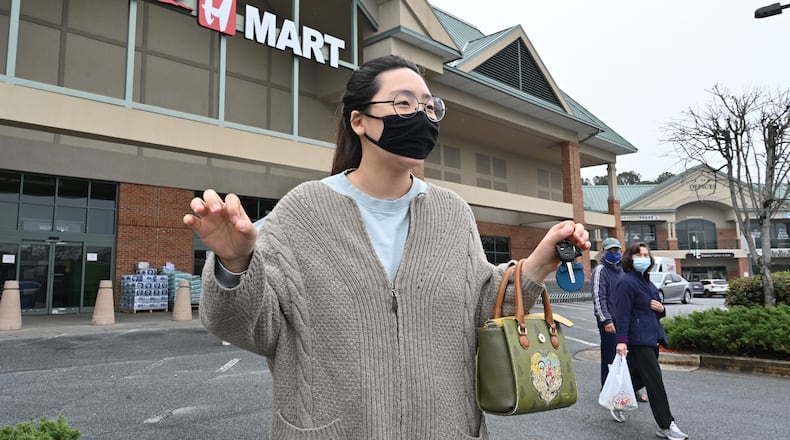The husband and wife, both 77, had an important talk before they went grocery shopping from their Atlanta home Wednesday morning.
They agreed: They would go straight into the Duluth store, get their shopping done and go home. No walking in the park this time. No relaxing. Not after Tuesday’s shootings at three metro Atlanta spas that left eight people dead — six of whom were, like them, Asian.
“It’s too dangerous to go outside,” said Soon Ja Kim, with her husband, Seok, by her side. “We are so scared now.”
Credit: HYOSUB SHIN / AJC
Credit: HYOSUB SHIN / AJC
Robert Aaron Long, 21, of Woodstock, admitted to the shootings, according to law enforcement, and claimed it was a sexual addiction, not racism, that prompted him to act.
But as the shocking news of the murders reverberated across local Korean and Asian American communities, many said they recognized echoes of the racism and discrimination they say have been undercurrents in their time in America – and particularly during the COVID-19 pandemic.
In the wake of the shootings, their unease has turned into fear.
Business owners and parents of school children have reported a recent rise in verbal harassment. In April, East Atlanta business owners found plaques affixed to buildings depicting Winnie the Pooh eating a bat with chopsticks below the words “Wuhan Plague.” The group Stop AAPI Hate recorded 32 hateful incidents in Georgia against Asian Americans between mid-March and October of last year, a tiny fraction of the 2,800 episodes recorded nationwide.
“With these upticks of what maybe people consider subtle violence or harassment, it actually has now snowballed into this incident,” said Stephanie Cho, executive director of the Atlanta chapter of Asian Americans Advancing Justice.
Susan Wong, who grew up in South Korea and lives in Duluth, said action is needed. “All Asian people, we have to protest together: ‘Save us.’”
She walked with another woman at a Gwinnett County park on Wednesday, but her fears of racism have grown. “When we walk in the park we don’t know if we are going to get targeted.”
For too long, said Helen Kim Ho, a Gwinnett-based attorney, the debate about racism in America has been focused on black versus white.
“The bigger picture is not going to change until there’s at least a growing, deeper acceptance that this anti-Asian hate and violence is an outcropping of racism, not something else,” she said. “In this particular instance it’s also a very strong example of violence against women that men have been historically able to get away with.”
One local woman described how her sister called from Korea, where they both were born, to warn her against going out now. A nephew in California texted the same.
Among the people shot were probably some who likely came to the U.S. in search of the American Dream, she said. She said she arrived in the United States in 1972 with $90, married a member of the U.S. Army, owned a string of businesses, had two kids who earned PhDs.
Korean authorities said four of those killed Tuesday were of Korean descent.
Damaino Yoo of Roswell said he had heard recent news accounts of apparently racially motivated attacks on Asians in places like New York, California and Chicago. But news of the massage parlor shootings sharpened his concerns.
“I worry about the future. I worry about my son and my grandbaby,” said Yoo, who is 72 and recently retired.
Several Asian Americans said their unease about becoming targets of racism grew during the pandemic — which is believed to have originated in China — amid the rhetoric of former President Donald Trump and some of his Georgia allies calling COVID-19 “Kung Flu” and the “China virus.”
“The pandemic and Trump’s xenophobic and racist language definitely normalized and gave certain people permission to be more out about anti-Asian hate,” said Ho, the attorney.
In metro Atlanta, about 6% of the population is Asian. In Gwinnett, it’s nearly 12%, according to analysis of U.S. Census data by the Atlanta Regional Commission.
Ho and other Asian Georgians viewed with particular alarm that six of the eight victims were Asian women. For too long, they said, Asian women have been fetishized and treated with discrimination.
There are “stereotypes of Asian women as geisha girls who possess a special sexuality.... All these stereotypes don’t help,” said Sue Ann Hong, CEO the Center for Asian Pacific American Women. “It’s an intersectionality between racism, sexism, stereotypes, and I think that all culminates to some of these incidents that happen.”
Just a day before the shootings, Georgia state Sen. Michelle Au told fellow senators about an alarming rise in hate crimes against Asian Americans. “All I’m asking right now, as the first East Asian state senator in Georgia, is simply to fully consider us as part of our communities. Recognize that we need help, we need protection, and we need people in power to stand up for us against hate.”
Michelle Kang, vice president of external affairs for the Duluth-based Korean-American Chamber of Commerce, is worried Tuesday’s murders could make Asian owners afraid to run their businesses.
Police in Gwinnett County say they’ve begun extra patrols in and around Asian businesses following Tuesday’s shootings.
South Korean-based businesses have been crucial jobs generators in Georgia, including Kia’s sprawling auto assembly plant in West Georgia, Hanwha Q Cells’ solar panel assembly plant in Dalton and electric vehicle battery maker SK Innovation’s multi-billion-dollar factory under construction in Jackson County.
— Hyosub Shin, Shelia Poole, Adrianne Murchison, Patricia Murphy and Arielle Kass contributed to this article
The Latest
Featured




